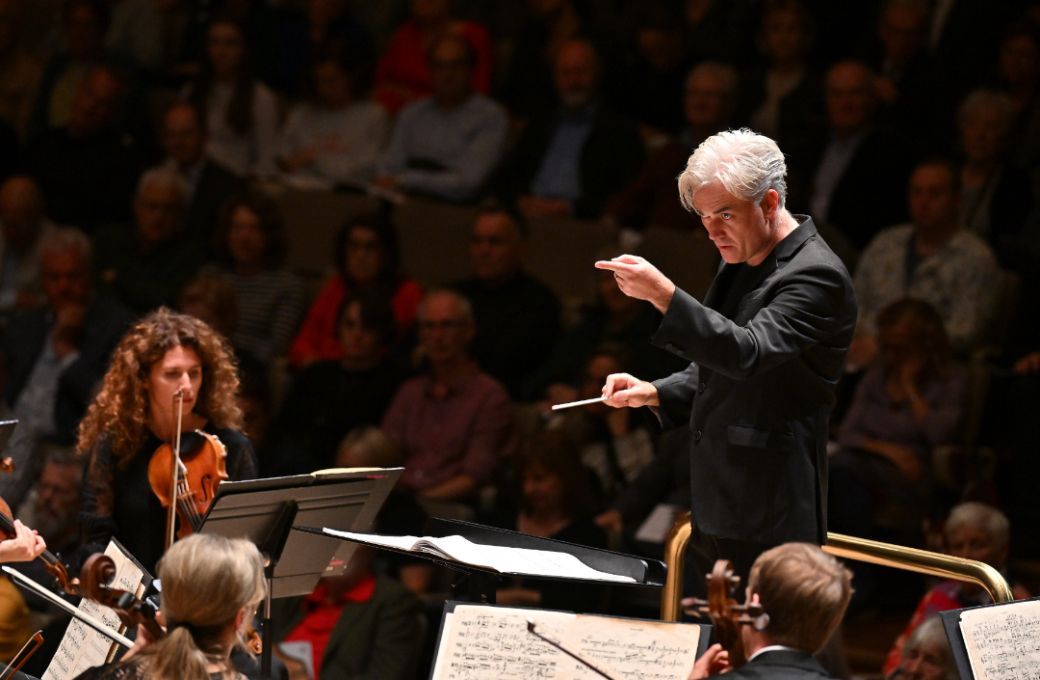The London Philharmonic Orchestra’s ‘Moments Remembered’ series continued this week with such a tightly, deftly interwoven dialogue between three works as to make Principal Conductor Edward Gardner’s programming as much a star of the night as the musicians onstage.

Richard Strauss’ Metamorphosen for 23 individual string parts was written in 1944 in the wake of the Allied bombing of the composer’s beloved Munich, Dresden and Vienna opera houses, and thus, with his characteristic lush harmonies channelled into an uncharacteristically austere, thematically concise memorial to German culture, its slowly transmogrifying material dominated by a Beethoven-reminiscent motif and Bach-reminiscent canonic entries; there’s also a theory that it expresses Strauss’ secret regret over engaging with the Nazis.
Isabelle Faust then joined the orchestra for one of the most expressly memory-laden violin concertos in the repertoire, Berg’s Violin Concerto “To the Memory of an Angel”. Composed in 1935 for the American violinist Louis Krasner, its ‘Angel’ and joint dedicatee was Manon Gropius, the widely loved daughter of Alma Mahler and Walter Gropius, who had just succumbed to polio aged 18. Distraught Berg’s two-movement concerto response depicts Manon first in full life, and then her battle with illness and death. 12-tone atonality rubs shoulders with more tonal language, and dreamily floating passages with driving rhythmic energy; there are bittersweet hauntings – fleeting ghosts of Viennese waltzes – and sharp-edged struggle, but eventually transfiguration, emotively signposted by a direct quote towards the end from Bach’s BWV 60 cantata, O Eternity, Thou Wondrous Word. Add further secret codes appearing to reference Berg’s secret teenage love affair which produced an illegitimate daughter, and it’s an emotionally searing open wound of a work.
Then after all this pained, soul-searching nostalgia? Brahms’ Second Symphony, the nobly pastoral bear-hug of a work (albeit with periodic darker thoughts) with which he banished his symphonic insecurities, and which, coincidentally, was penned in Pörtschach, just across the Wörthersee from where Berg would write his Violin Concerto.
On paper all the above sounds moving. Moving through the air of the Royal Festival Hall, it was magical. First, a soberly flowing, clean-contoured, lucid-textured Metamorphosen, each fresh link in its chain of harmonic and coloristic shifts happening with both subtlety and complete clarity, like steady onward clicks of a fine dial. This was supreme strings playing, individually and as a tight-knit unit, inspiring such a listening intensity that, in the pause before their bleak final straight, the silence in the hall was death-like.
Then the Berg. Faust is one of today’s most acclaimed exponents of the work, and the first marvel was her near-silent pianissimo sailing effortlessly to the back of the hall; followed by the effortless technique through which she coloured her intensely-felt rhetoric, lyrical and fiery, with a panoply of poetic micro-detail. Crucially too, everyone was embracing this not being a grandstanding soloistic work, but a stage-wide search for the ineffable in which the soloist acts as central nucleus. The orchestra itself was wonderful, its own striking moments including the woodwind statement of the Bach chorale – golden-toned, pearly-haloed, it sounded like heaven. As did Faust’s final silky final ascent into the orchestra’s concluding softly, luminously radiant chordal cloud. Its final decay dissolved into sustained silence from a bewitched, moved hall... before tumultuous applause and face-cracking smiles from Faust and Gardner. There was no encore from Faust, and rightly so. Even Bach would have jarred.
Then warm and weighty Brahms with high-definition rhythmic handling, phrasing and dynamics, and not a single note or nuance going unloved, its rip-roaring finale ending in a blaze of brass and woodwind sunlight, and galloping, singing strings. I almost cheered. Many did.


